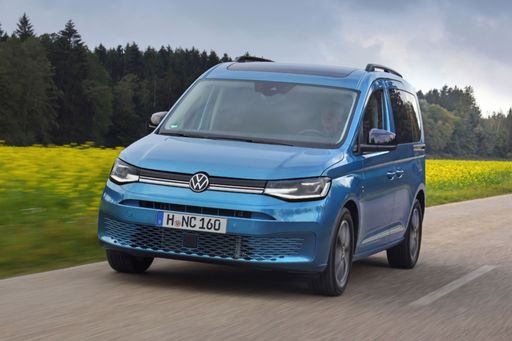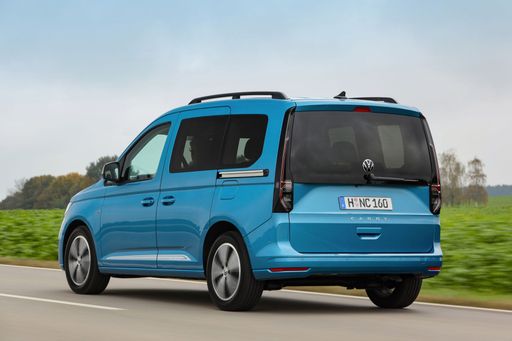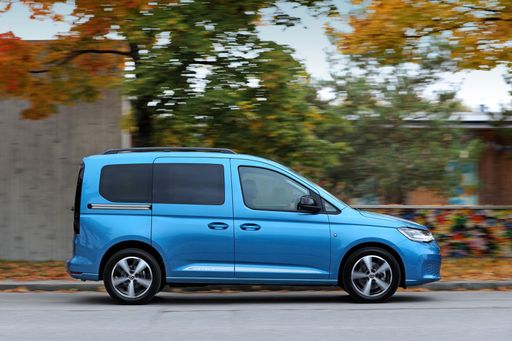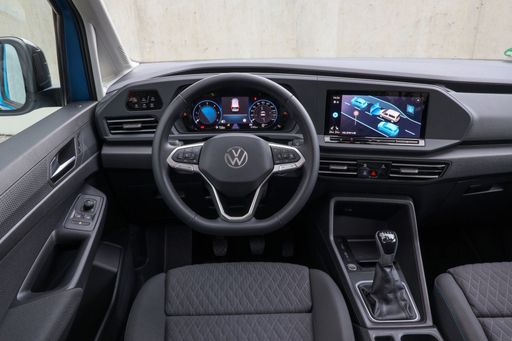Toyota Yaris vs VW Caddy – Differences & prices compared
Compare performance, boot space, consumption and price in one view.
Find out now: which car is the better choice for you – Toyota Yaris or VW Caddy?
The Toyota Yaris (Hatchback) comes with a Full Hybrid or Petrol engine and Automatic or Manuel transmission. In comparison, the VW Caddy (High Roof Estate) features a Petrol, Diesel or Plugin Hybrid engine with Manuel or Automatic transmission.
When it comes to boot capacity, the Toyota Yaris offers 286 L, while the VW Caddy provides – depending on how much space you need. If you’re looking for more power, decide whether the 280 HP of the Toyota Yaris or the 150 HP of the VW Caddy suits your needs better.
In terms of consumption, the values are 3.80 L per 100 km for the Toyota Yaris, and 0.50 L for the VW Caddy.
Price-wise, the Toyota Yaris starts at 21900 £, while the VW Caddy is available from 27800 £. Compare all the details and find out which model fits your lifestyle best!
Toyota Yaris
The Toyota Yaris exudes a charming blend of practicality and style, making it an appealing choice for urban drivers. Its compact design allows for easy manoeuvrability in crowded city streets, while the interior offers a surprisingly spacious and comfortable environment. With a focus on fuel efficiency and reliability, the Yaris remains a popular option for those seeking a balance between performance and economy.
details @ Toyota
@ Toyota
 @ Toyota
@ Toyota
VW Caddy
The VW Nutzfahrzeuge Caddy Hochdach-Kombi is a versatile choice for those seeking extra space and practicality in their everyday vehicle. With its functional high roof and adaptable interior, it easily accommodates both passengers and cargo. The Caddy also stands out with its modern design and features aimed at providing comfort and convenience on the road.
details @ vwpress
@ vwpress
 @ vwpress
@ vwpress
 @ vwpress
@ vwpress
 @ vwpress
@ vwpress

|

|
|
|
|
Costs and Consumption |
|
|---|---|
|
Price
21900 - 45000 £
|
Price
27800 - 45900 £
|
|
Consumption L/100km
3.8 - 9.5 L
|
Consumption L/100km
0.5 - 6.9 L
|
|
Consumption kWh/100km
-
|
Consumption kWh/100km
-
|
|
Electric Range
-
|
Electric Range
116 - 121 km
|
|
Battery Capacity
-
|
Battery Capacity
19.70 kWh
|
|
co2
87 - 215 g/km
|
co2
10 - 165 g/km
|
|
Fuel tank capacity
36 - 50 L
|
Fuel tank capacity
50 L
|
Dimensions and Body |
|
|---|---|
|
Body Type
Hatchback
|
Body Type
High Roof Estate
|
|
Seats
4 - 5
|
Seats
5 - 7
|
|
Doors
3 - 5
|
Doors
5
|
|
Curb weight
1090 - 1356 kg
|
Curb weight
1575 - 1998 kg
|
|
Trunk capacity
141 - 286 L
|
Trunk capacity
-
|
|
Length
3940 - 3995 mm
|
Length
4500 - 4853 mm
|
|
Width
1745 - 1805 mm
|
Width
1855 mm
|
|
Height
1455 - 1500 mm
|
Height
1819 - 1860 mm
|
|
Payload
289 - 525 kg
|
Payload
501 - 710 kg
|
Engine and Performance |
|
|---|---|
|
Engine Type
Full Hybrid, Petrol
|
Engine Type
Petrol, Diesel, Plugin Hybrid
|
|
Transmission
Automatic, Manuel
|
Transmission
Manuel, Automatic
|
|
Transmission Detail
Manual Gearbox, Automatic Gearbox, CVT
|
Transmission Detail
Manual Gearbox, Dual-Clutch Automatic
|
|
Drive Type
Front-Wheel Drive, All-Wheel Drive
|
Drive Type
Front-Wheel Drive, All-Wheel Drive
|
|
Power HP
116 - 280 HP
|
Power HP
102 - 150 HP
|
|
Acceleration 0-100km/h
5.5 - 9.7 s
|
Acceleration 0-100km/h
11.4 - 14 s
|
|
Max Speed
175 - 230 km/h
|
Max Speed
173 - 186 km/h
|
|
Torque
390 Nm
|
Torque
220 - 320 Nm
|
|
Number of Cylinders
3
|
Number of Cylinders
4
|
|
Power kW
85 - 206 kW
|
Power kW
75 - 110 kW
|
|
Engine capacity
1490 - 1618 cm3
|
Engine capacity
1498 - 1968 cm3
|
General |
|
|---|---|
|
Model Year
2024 - 2025
|
Model Year
2024
|
|
CO2 Efficiency Class
B, G
|
CO2 Efficiency Class
E, F, B
|
|
Brand
Toyota
|
Brand
VW
|
Toyota Yaris
Introducing the Next-Gen Toyota Yaris: A Blend of Innovation and Technology
The Toyota Yaris has long been lauded for its efficiency, reliability, and practicality. As we venture into the 2024 model year, Toyota has upped the ante with the latest versions of this popular hatchback, melding cutting-edge technology with eco-conscious design. Here’s an in-depth look at what makes the current Yaris line-up stand out from the crowd.
Efficient Powertrains: Hybrid and Beyond
Spearheading the technological innovation in the Yaris range is the introduction of various hybrid models. The Yaris offers a 1.5-litre full-hybrid engine, marrying a petrol engine with an electric motor to produce between 116 and 130 PS. This power blend is controlled via a sophisticated CVT-gearbox, optimizing both performance and fuel efficiency, with consumption figures ranging from an impressive 3.8 to 4.2 litres per 100 km.
For those seeking pure performance, the GR Yaris variants provide a turbocharged 1.6-litre engine capable of producing 280 PS. This power is delivered via a choice of manual or automatic transmission, giving drivers the tactile involvement or convenience they desire.
Design that Fulfils and Inspires
The Yaris hasn't forgotten its roots as a compact, city-friendly hatchback, measuring between 3,940 and 3,995 mm in length. With its bold front grille, sleek lines, and a choice of striking colours, it's a car that turns heads while remaining perfectly suited for urban environments.
The interior is equally impressive, designed with a focus on driver convenience and comfort. Depending on the variant, Yaris can offer generous cargo space of up to 286 litres, making it a perfect companion for everyday tasks or weekend escapes.
Technological Integration: The Smart Choice
Toyota's approach goes beyond just improving engine technology; the Yaris is packed with innovative features aimed at enhancing the driving experience. It boasts a suite of advanced safety systems such as lane departure alert, pre-collision system, and adaptive cruise control, ensuring peace of mind on the road.
The infotainment system in the Yaris is designed to keep you connected, offering seamless smartphone integration, a user-friendly interface, and an intuitive navigation system, ensuring that you're always informed and entertained.
The Cost of Innovation
Owning a Yaris is not just about impressive technology; it's also about making economic sense. With a price range between €25,500 and €49,990, and monthly costs spanning from €748 to €1,513, it offers a broad spectrum to suit different budget needs.
Concerned about emissions? You can rest easy knowing that the Yaris boasts a CO2 efficiency class ranging from B to G, thanks to its low emissions output of between 87 to 215 g/km.
Conclusion: The Toyota Yaris Drives the Future
The Toyota Yaris continues to be a strong contender in the compact car segment, pushing boundaries with its innovative full-hybrid systems and performance-oriented GR models. It's a remarkable blend of design, technology, and economy, ensuring it remains a top choice for drivers who demand more from their hatchbacks.
Whether you're seeking the efficiency of a hybrid or the thrill of the GR Yaris, there's a model tailored to your unique driving needs in Toyota's latest Yaris lineup.
VW Caddy
A Versatile Classic Reimagined: The Volkswagen Caddy
The Volkswagen Caddy has long been celebrated as a versatile workhorse, adeptly bridging the gap between utility and comfort. With its roots tracing back to the 1980s, the Caddy has evolved considerably, transforming from a humble commercial vehicle to a sophisticated multi-purpose van. The latest model continues this tradition by offering innovative features and enhanced technical specifications, reaffirming its status as an indispensable vehicle for both professional and personal use.
Efficient Engines and Environmental Innovation
At the heart of the Volkswagen Caddy lies an array of engines designed to balance performance with efficiency. The latest generation offers a selection of TSI petrol and TDI diesel engines, each engineered to meet the strictest environmental standards. These Euro 6 compliant engines not only reduce emissions but also ensure optimal fuel efficiency, making the Caddy an economically viable choice for businesses and environmentally conscious drivers alike.
For those seeking an even greener option, Volkswagen offers a natural gas engine variant. This innovative powertrain reduces CO2 emissions significantly, yet delivers a driving experience that remains characteristically smooth and powerful. This commitment to alternative energy sources reflects Volkswagen's dedication to sustainability and forward-thinking automotive design.
Advanced Connectivity and Safety Features
The Volkswagen Caddy is not just about robust performance; it also shines in the realm of technology and safety. The modern dashboard is equipped with the Discover Media navigation system, integrating satellite navigation with real-time traffic updates. This intuitive infotainment system gets wirelessly connected to smartphones via Apple CarPlay and Android Auto, keeping drivers informed and entertained during every journey.
Safety is paramount in the latest Caddy, which comes standard with a suite of advanced driver assistance systems. Front Assist with City Emergency Braking ensures crucial safety in urban environments, while Adaptive Cruise Control with speed limiter provides comfort and control on the open road. Additionally, features like the Park Assist system make maneuvering in tight spaces a breeze, offering peace of mind and ease of use no matter the driving conditions.
Dynamic Design and Practicality
Blending aesthetics with functionality, the redesigned exterior of the Volkswagen Caddy is both modern and practical. It features a streamlined silhouette that not only improves aerodynamic efficiency but also enhances its visual appeal. From the distinctive front grille to the LED headlamps, every design element serves a purpose, resonating Volkswagen’s design philosophy of form following function.
Inside, the Caddy offers a remarkably spacious interior, adaptable to a variety of needs. Depending on the configuration, it accommodates up to seven passengers comfortably or can be transformed to offer substantial cargo space, catering to professionals who require versatility from their vehicles. The interior details are thoughtfully crafted, with high-quality materials that sustain durability and comfort over long-term use.
Conclusion: A Modern Mainstay
The Volkswagen Caddy, with its latest iteration, continues to embody versatility and innovation. Its efficient powertrains, cutting-edge connectivity features, and commitment to safety set new standards in the compact van segment. Whether utilized as a family vehicle or a business asset, the Caddy remains a formidable choice, carrying forward a legacy of reliability and ingenuity.
For drivers seeking a well-rounded vehicle that offers the best of both worlds—commercial reliability with personal comfort—the Volkswagen Caddy stands as an exemplary choice. It is not just a vehicle; it's a partner on wheels, designed for the multifaceted demands of modern life.
Which drive types are available for the Toyota Yaris?
Available as Front-Wheel Drive or All-Wheel Drive.
The prices and data displayed are estimates based on German list prices and may vary by country. This information is not legally binding.
